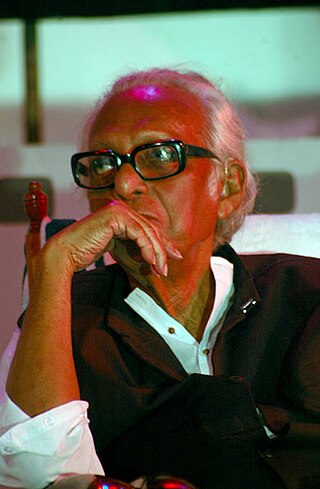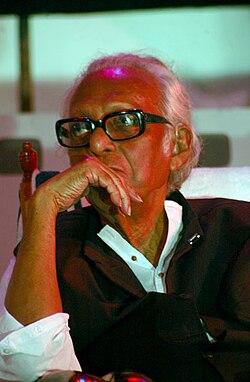Top Qs
Timeline
Chat
Perspective
Mrinal Sen
Indian film director (1923–2018) From Wikipedia, the free encyclopedia
Remove ads
Mrinal Sen (/mrɪˈnɑːl/ Bengali pronunciation: [/mriːˈnal/]; 14 May 1923 – 30 December 2018) was an Indian film director and screenwriter known for his work primarily in Bengali, and a few Hindi and Telugu language films. Regarded as one of the finest Indian filmmakers, along with his contemporaries Satyajit Ray, Ritwik Ghatak, and Tapan Sinha, Sen played a major role in India's parallel cinema movement, which offered a realistic, socially aware counterpoint to splashy Bollywood films, as well as in the country's New Wave cinema.[2][3] He also served as the President of FTII from 1984 to 1986.
Sen received various national and international honors including eighteen Indian National Film Awards. The Government of India honored him with the Padma Bhushan, and the Government of France honored him with the Ordre des Arts et des Lettres, while Russian Government honored him with the Order of Friendship. Sen was also awarded the Dadasaheb Phalke Award, the highest award for filmmakers in India.[4]
He was one of the few Indian filmmakers to have won awards at the big three film festivals viz., Cannes, Venice and the Berlinale.[3][5] Sen was a self described "private Marxist".[6]
Remove ads
Early life
Summarize
Perspective
Mrinal was born into a Hindu family in Faridpur district, East Bengal—now Bangladesh. His father, Dineshchandra Sen, was a lawyer who supported Indian freedom fighters.[7] His mother was Saraju Sen.[8]
In the early 1940s, Mrinal moved to Kolkata to study physics at Scottish Church College.[2] Like many middle-class students of the time, he was drawn to student politics, public theatre, and the struggle to find work. After Partition in 1947, his family settled in Kolkata permanently.[7]
A voracious reader, he spent hours at the National Library of India (then the Imperial Library), reading books amid the political unrest of the time. In the evenings, he worked as a private tutor. One day, he came across Rudolf Arnheim’s Film as Art, followed by Vladimir Nilsen's The Cinema as a Graphic Art—books that profoundly influenced his journey into filmmaking.[9][7]
He became involved with the Indian People’s Theatre Association (IPTA), backed by the Communist Party of India.[10] He and his friends—Ritwik Ghatak, Salil Chowdhury, Tapan Sinha, and occasionally Bijan Bhattacharya—spent hours in adda, a Bengali tradition of intense, freewheeling discussions on art, politics, and life. Their favorite meeting place was a restaurant near Basusree Cinemahall, where, in 1955, they first watched Satyajit Ray’s Pather Panchali.[7]
Around this time, Mrinal met Geeta Shome (née Sen), whom he married in 1953. As a token of his affection, the first gift he gave her was Notes from the Gallows by Julius Fučík.[7]
Remove ads
Influence
Mrinal Sen directed Bhuvan Shome (Mr. Shome, 1969) which initiated the "New Wave Cinema Movement" in India.[11]
Film craft, Social context and its political influence
The films that he made next were essentially political, and earned him the reputation as a Marxist artist.[12] This was also the time of large-scale political unrest throughout India. Particularly in and around Calcutta, this period underwent what is now known as the Naxalite movement. This phase was immediately followed by a series of films where he shifted his focus, and instead of looking for enemies outside, he looked for the enemy within his own middle class society. This was arguably his most creative phase.
Depiction of Kolkata
In many Mrinal Sen movies from Punascha (1961) to Mahaprithivi (1992), Kolkata features prominently. He has shown Kolkata as a character, and as an inspiration. He has beautifully woven the people, value system, class difference and the roads of the city into his movies and coming of age for Kolkata, his El-Dorado.[13]
Remove ads
Recognition
In 1982 he was a member of the jury at the 32nd Berlin International Film Festival.[14] In 1983 he was a member of the jury at the 13th Moscow International Film Festival.[15] In 1997 Sen became the member of the jury at the 20th Moscow International Film Festival.[16] On 24 July 2012, Sen was not invited to the function organised by Government of West Bengal to felicitate film personalities from the State. As per reports, his political views are believed to be the reason for his omission from the function.[17]
Death
Sen had age-related ailments for many years. He died on 30 December 2018 at the age of 95 at his home in Bhawanipore, Kolkata.[18] The cause was a heart attack.[19]
Awards
Summarize
Perspective
National Film Awards
- 1969: Bhuvan Shome
- 1974: Chorus
- 1976: Mrigayaa
- 1980: Akaler Sandhane
- 1972: Calcutta 71
- 1980: Kharij
- 1969: Bhuvan Shome
- 1979: Ek Din Pratidin
- 1980: Akaler Sandhane
- 1984: Khandhar
- 1974: Padatik
- 1983: Akaler Sandhane
- 1984: Kharij
- 1978: Parashuram
Best Regional Film Awards
- 1961: Punascha
- 1965: Akash Kusum
- 1993: Antareen
- 1977: Oka Oori Katha
Filmfare Awards
- Critics Award for Best Film
1976 Mrigayaa
Best Screenplay
1984 Khandhar
Best Director - Bengali
1982 Akaler Shandhaney
Filmfare Lifetime Achievement Award
2017 Bengali Cinema
International awards
- 4th International Film Festival of India - Jury Prize - Bhuvan Shome - 1969[20]
- Moscow International Film Festival - Silver Prize – Parashuram[21]
1975 Chorus[22] – 1979
- Karlovy Vary International Film Festival - Special Jury Prize
1977 Oka Oori Katha
- Berlin International Film Festival
Interfilm Award
1979 Parashuram
1981 Akaler Sandhane
Grand Jury Prize[23]
1981 Akaler Sandhane
- Cannes Film Festival - Jury Prize
1983 Kharij
- Chicago International Film Festival - Gold Hugo
1984 Khandhar
- Montreal World Film Festival - Special Prize of the Jury
1984 Khandhar
- Venice Film Festival - OCIC Award - Honorable Mention
1989 Ek Din Achanak
- Cairo International Film Festival - Silver Pyramid for Best Director
2002 Aamar Bhuban
Remove ads
State and institutional honors
- In 1979, he was awarded the Nehru Soviet Land Award by the Union of Soviet Socialist Republics for his contribution to world cinema.
- In 1981, the Government of India awarded Sen with the Padma Bhushan.[24]
- In 1985, President François Mitterrand, the President of France, awarded him the Commandeur de Ordre des Arts et des Lettres (Commander of the Order of Arts and Letters)[25]
- In 1993, he was awarded an honorary D.Litt. by the University of Burdwan.
- In 1996, he was awarded an honorary D.Litt. by Jadavpur University.
- In 1999, he was awarded an honorary D.Litt. by Rabindra Bharati University.[26]
- Between 1998 and 2003, he was made an Honorary Member of the Indian Parliament in the Rajya Sabha.
- In 2000, President Vladimir Putin of the Russian Federation honored him with the Order of Friendship.
- In 2005, the Dadasaheb Phalke Award, the highest honor given to an Indian filmmaker, was awarded to him by the Government of India for the year 2003.[27]
- In 2009, he was awarded an honorary D. Litt., by the University of Calcutta.[28]
- In 2017, he was inducted as a member of the Oscar Academy[29]
Remove ads
Filmography
- Raat Bhore (The Dawn) (1955)
- Neel Akasher Neechey (Under the Blue Sky) (1959)
- Baishe Shravana (Wedding Day) (1960)
- Punascha (Over Again) (1961)
- Abasheshe (And at Last) (1963)
- Pratinidhi (The Representative) (1964)
- Akash Kusum (Up in the Clouds) (1965)
- Matira Manisha (Man of the Soil) (Odia film) (1966)
- Bhuvan Shome (Mr. Bhuvan Shome) (1969)
- Ichhapuran (1970)
- Interview (1971)
- Ek Adhuri Kahani (An Unfinished Story) (1971)
- Calcutta 71 (1972)
- Padatik (The Guerilla Fighter) (1973)
- Chorus (1974)
- Mrigaya (The Royal Hunt) (1976)
- Oka Oori Katha (The Outsiders) (1977)
- Parashuram (The Man with the Axe) (1978)
- Ek Din Pratidin (And Quiet Rolls the Dawn) (1979)
- Akaler Shandhaney (In Search of Famine) (1980)
- Chalchitra (The Kaleidoscope) (1981)
- Kharij (The Case Is Closed) (1982)
- Khandhar (The Ruins) (1983)
- Genesis (1986)
- Kabhi Door Kabhi Paas (1986–87) (12 short films made for television broadcast)
- Ek Din Achanak (Suddenly, One Day) (1989)
- Mahaprithibi (World Within, World Without) (1991)
- Antareen (The Confined) (1993)
- Amar Bhuvan (This, My Land) (2002)
Remove ads
See also
References
External links
Wikiwand - on
Seamless Wikipedia browsing. On steroids.
Remove ads

